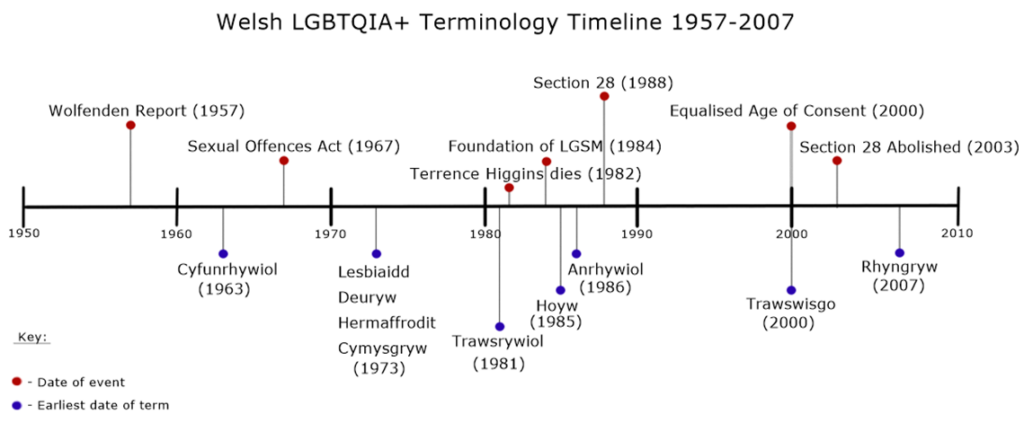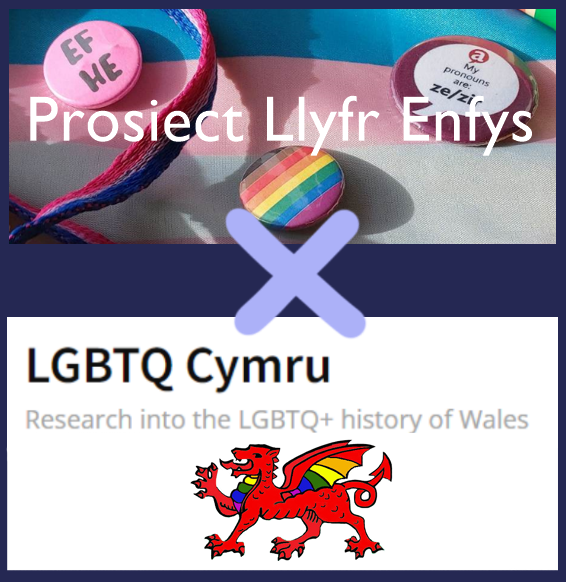[Chapter extract from the Undergraduate dissertation “What drove the development of Welsh-language LGBTQIA+ terminology 1972-2022” by Luke Blaidd (2023)]

Fig. 1: Welsh LGBTQIA+ dictionary terminology timeline and events in UK LGBTQIA+ history 1957-2007
Welsh language LGBTQIA+ terminology in the mid-20th Century was much the same as it had been in the 19th and 18th Centuries. Relevant terminology in early 20th Century Welsh dictionaries related exclusively to homosexuality or intersexuality and terms included were largely Biblical or clinical in scope. For example, Gwrywgydiwr (homosexual) originated in Salesbury’s New Testament translation and has since appeared in many dictionaries. The term appeared in a Welsh dictionary in 1934[i] for instance.
Homosexuality in the United Kingdom would not be partially decriminalised until the passing of the Sexual Offences Act 1967[ii]. Much of the Welsh LGBTQIA+ terminology in this period was overtly negative towards homosexuality- often originating from Biblical condemnations of same-sex love and desire. It would be a Welsh Member of Parliament, Leo Abse, who would propose the bill partially decriminalising homosexuality in the United Kingdom. Abse argued, based on the findings of the Wolfenden Report of 1957, that consenting homosexual acts should not be an imprisonable offence[iii].
Seven years after the publication of the Wolfenden Report, the Sexual Offences Act had still not been passed, however, something that was beginning to emerge in Welsh was new terminology relating to homosexuality. This would be the first new terminology relating to homosexuality to emerge in a Welsh dictionary for an exceptionally long time.
Y Geiriadur Mawr (in its 1963 edition) included the neologism cyfunrhywiol (homosexual) as well as older terminology such as gwrywgydiwr and sodomiad (sodomy)[iv]. Initially, cyfunrhywiol was confined to the English side of the dictionary under the headword ‘homosexual’, while the Welsh side of the dictionary did not include cyfunrhywiol as a headword, but gwrywgydiwr instead. This may be the case for two reasons- the first being ergonomics, so that users searching for gwrywgydiwr who are unfamiliar with the newer term cyfunrhywiol will not miss the entry. The second reason being the presence of social stigma around homosexuality in Wales at the time, as evidenced by the description provided under the gwrywgydiwr entry, which defines homosexual as “cydiwr annaturiol” (tr. ‘unnatural copulator’). ‘Uneven’ bilingual dictionaries- those which include a term on one side but not on the other, (or, if present on both sides, one containing information absent on the other) surface semi-frequently. Y Geiriadur Mawr, whatever the reason for its ‘unevenness’, is one of them.
The Wolfenden Report’s committee included, for a time, Welshman Goronwy Rees, former principal of University College Wales Aberystwyth between 1953 and 1956[v]. Rees resigned from academia and the committee in 1956, owing to a scandal. However, Welshmen would continue to play a significant role in the partial decriminalisation of homosexuality in the United Kingdom. Leo Abse attempted several times to introduce his bill partially decriminalising homosexuality, finally succeeding in 1967, which in turn ushered in a new era for LGBTQIA+ rights in the United Kingdom. The next decade would be the first in which men could have sex with each other without fear of legal repercussions- with the caveat that the law was still extremely restrictive. The law set the age of consent for gay men to 21 and only permitted them to have sex if they were alone in their building, ruling out most homes, hotels and lodgings. The ability to arrange sex was also made difficult due to the wording of the law around solicitation, making it difficult for most gay men to take advantage of the partial decriminalisation. But it would also be a decade in which Welsh-language revitalisation activism would come into prominence, following Saunders Lewis’ famous Tynged yr Iaith speech in 1961. The LGBTQIA+ rights movement and the Welsh language revitalisation movement co-occurred in this century- separate though they were, they impacted one another at various points. This research deals primarily with the LGBTQIA+ experience of the Welsh language, however, so the Welsh language revitalisation movement, though tangentially relevant in places, will not be given too much focus here[vi].
Six years after the Sexual Offences Act 1967 partially decriminalised sex between men, the term cyfunrhywiol began to appear in dictionaries more frequently. By 1972 it had appeared in a reprint of the 1960 edition of the Collins-Spurrell Welsh Dictionary, albeit still confined to the English side of the dictionary, with gwrywgydiwr on the Welsh side of the book[vii].
The Wolfenden Report 1957 and the Sexual Offences Act 1967 may have acted as catalysts for the creation of new Welsh LGBTQIA+ terminology in the 20th Century. By the year 1972, cyfunrhywiol had cemented itself as a term for homosexuality. But cyfunrhywiol would just be the start of an expansion in new Welsh LGBTQIA+ terminology throughout the latter half of the 20th Century.
[For more extracts from my dissertation and updates on my project, follow me on tumblr and Instagram @llyfrenfys and on Mastodon @llyfraublaidd@toot.wales. To support my project, consider subscribing to my Patreon at https://www.patreon.com/ProsiectLlyfrEnfys]
References:
- Spurrell, W., Geiriadur Cymraeg a Saesneg: Spurrell’s Welsh-English Dictionary, (1934), W. Spurrell & Son, p.230
- Leeworthy, D., A Little Gay History of Wales, (2019), University of Wales Press, p.93
- Shopland, N., Forbidden Lives, (2017), Seren Books, p. 192-193
- Evans, H.M., and Thomas, W.O, Y Geiriadur Mawr, (1963) Llandysul, p. 273
- Spurrell, W., The Collins-Spurrell Welsh Dictionary, (ed. Henry Lewis), (1972), William Collins Sons & Co. Ltd., p. 101
- Phillips, D., The Dragon Roars, University of California Celtic Conference, (2000).
[i] Spurrell, W., Geiriadur Cymraeg a Saesneg: Spurrell’s Welsh-English Dictionary, (1934), W. Spurrell & Son, p.230
[ii] Leeworthy, D., A Little Gay History of Wales, (2019), University of Wales Press, p.93
[iii] Shopland, N., Forbidden Lives, (2017), Seren Books, p. 192-193
[iv] Evans, H.M., and Thomas, W.O, Y Geiriadur Mawr, (1963) Llandysul, p. 273
[v] Shopland, N., Forbidden Lives, (2017), Seren Books, p. 179
[vi] For coverage of the Welsh language revitalisation movement, see Phillips, D., The Dragon Roars, University of California Celtic Conference, (2000).
[vii] Spurrell, W., The Collins-Spurrell Welsh Dictionary, (ed. Henry Lewis), (1972), William Collins Sons & Co. Ltd., p. 101
